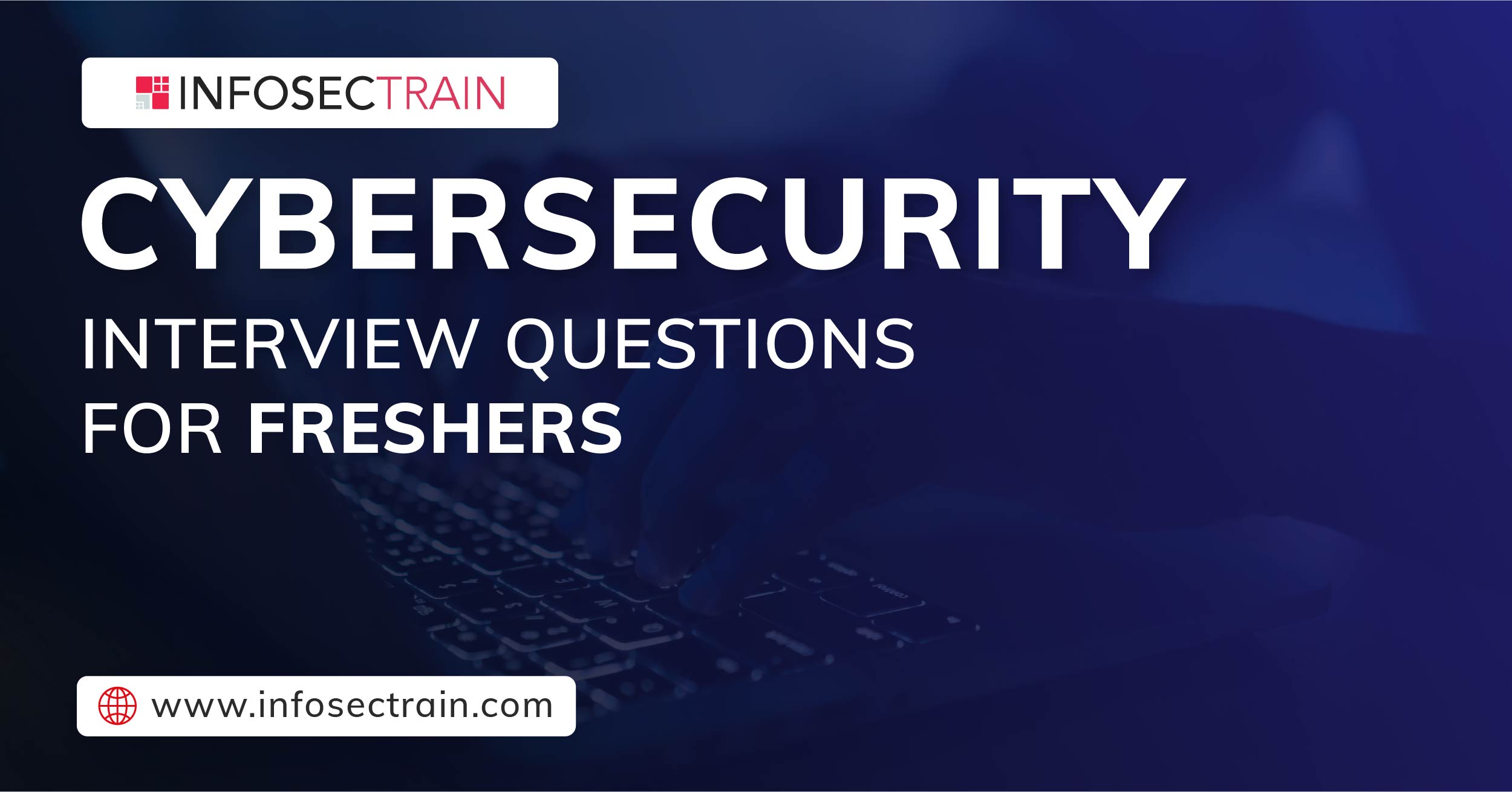Cybersecurity interview questions for freshers
Aspiring to start your career in Cybersecurity? Here we bring the top Cybersecurity interview questions for freshers that will help you get your first job.
We live in such an era where everything is digitalized. From restaurant orders to the public healthcare system and even critical information of a nation’s defense system is digitalized. With users storing massive amounts of data online, it is no doubt that the data is vulnerable to fraudulent hackers.
IT Companies are noticing the criticality of the situation, and hence, the demand for cybersecurity officers is rapidly increasing. Due to the increase in demand, there is a lot of competition among the domain.
Enroll Now: Cybersecurity Training Course

Hence, if you want a job in Cybersecurity, you have to be one of the best. Freshers that give quick answers to cybersecurity interview questions for freshers get a good headstart for starting their cybersecurity career. It is highly advised that you prepare from sample cybersecurity interview questions for freshers to improve your grasp over the core concepts of Cybersecurity.
Latest Cybersecurity Interview Questions for Freshers
If you are a fresher and are wondering about how to prepare for a cybersecurity interview, we have created a list of 20 best cybersecurity interview questions for freshers. Let us get started with them:
1) Define Cybersecurity?
Ans: Cybersecurity is the protection given to internet-connected systems like software, hardware, and electronic data, from unauthorized access and cyber-attacks.
2) What can you do to prevent Cross-Site Scripting?
Ans: To prevent Cross-Site Scripting, we can follow a few practices such as Using an XSS HTML Filter, Encoding special characters, Using Anti-XSS services/tools, and Validating user inputs.
3) Mention the difference between Threat, Vulnerability, and Risk?
Ans: Cybersecurity interview questions for freshers like these checks your expertise in all the core concepts of Cybersecurity. A threat is when someone has the potential to harm the official data to a system by damaging or destroying it, like a Phishing attack. Vulnerability is referred to as the weaknesses found in a system that can cause potential threat outcomes, like SQL injections and cross-site scripting. Risk refers to the damage that can be done to the data if or when a threat exploits the vulnerability that was already present.
4) What is a Botnet?
Ans: A Botnet basically refers to a group of devices that are internet-connected, such as servers, PCs, and mobile devices that can be affected and controlled by some kind of malware.
The above cybersecurity interview questions for freshers will be asked when the interviewers want to know about your understanding of the basic concepts of Cybersecurity.
5) State the difference between IDS and IPS?
Ans: Intrusion Detection Systems (IDS) is a simple monitoring system that detects intrusion but cannot prevent it. Intrusion Prevention Systems (IPS) is a control system that detects as well as prevents intrusion.
6) Is there any difference between information protection and information assurance?
Ans: Yes. Information protection uses security software and encryption to protect the data from unauthorized access. While information assurance ensures authentication, availability, and confidentiality of data and keeps it reliable.
7) What is Remote Desktop Protocol (RDP)?
Ans: Cybersecurity interview questions for freshers like these test your knowledge on various technicalities of Cybersecurity.
RDP or Remote Desktop Protocol is a Microsoft protocol that is designed for transfer security and encryption of data. This is implemented between users, client devices, and a virtual network server.
8) What is cybersecurity risk assessment?
Ans: The detection of vulnerable information assets like customer data and hardware, that are prone to cyber-attacks is called cybersecurity risk assessment. It is practiced to figure out and prioritize risks across companies.
9) What is a false positive and false negative in IDS?
Ans: A false positive in IDS is considered a false alarm that is fired for legitimate network activity.
A false negative is considered to be the most complicated state and occurs when the IDS fails to identify and alert malicious network traffic.
10) What is cognitive security?
Ans: Cognitive security is primarily an application of AI technology that identifies threats and protects the physical and digital systems. It is based on human understanding processes.
Also Read: Top Cybersecurity Interview Questions
11) What is the importance of DNS monitoring?
Ans: DNS or Domain Name System Monitoring helps ensure the continuity of proper traffic routing to services, websites, and electronic communications.
12) What is IGMP?
Ans: IGMP or Internet Group Management Protocol is a communication protocol used by video or game streaming.
13) Mention a difference between symmetric and asymmetric encryption.
These cybersecurity interview questions for freshers target the candidate’s grasp on the notions of cybersecurity ecosystem.
Ans: Symmetric encryption encrypts and decrypts using the same key. It’s much faster due to the simpler maths involved. Asymmetric encryption encrypts and decrypts using different kets.
14) What is CSRF?
Ans: CSRF or Cross-Site Request Forgery is a vulnerability of web applications where the server goes straight to processing before checking whether a request has come from a trusted client or not.
15) What is a Black hat, White hat, and Grey hat hacker?
This cybersecurity interview questions for freshers is asked to usually confuse the interviewee. A tip for answering it is to keep the answer very simple.
Ans: A Black hat hacker hacks without authority. A White hat hacker performs an authorized hacking attempt under signed NDA. A Grey hat hacker is initially a white hat hacker who performs unauthorized activities sometimes.
16) What is a CIA triangle?
Ans: A CIA triangle refers to Confidentiality, Integrity, and Availability. It is keeping information secret, unaltered, and available at all times.
17) What is compliance?
Ans: Compliance is referred to the following a certain set of standards and rules that is set by a government/Independent party/organization.
18) Explain the objects of Basic web architecture?
For cybersecurity interview questions for freshers like these, it is best to stay generic as different architecture contains different objects.
Ans: Basic web architecture should contain objects, including a database server, front-ending server, and a web application server.
19) What do you mean by port scanning?
Ans: It is the process of gathering information about network, system, etc. by sending messages and then analyzing the responses.
20) What is HIDS and NIDS?
Ans: HIDS is a host intrusion detection system that is placed on each host. NIDS is a network intrusion detection system that is placed in the network.
Also Check: Top 20 Cybersecurity Certifications
Final Words
Here we reach at the end of some of the most common Cybersecurity interview questions for freshers. These were some of the beginner-level cybersecurity interview questions, which included the primary understanding of Cybersecurity and how it works.
This set also covers some of the more relevant questions that have been asked recently in cybersecurity interviews. With the help of these cybersecurity interview questions for freshers, you can immediately start your preparation for the interview.
So, learn the basics of Cybersecurity and get ready with these most common Cybersecurity interview questions to give your cybersecurity career a good start.






 1800-843-7890 (India)
1800-843-7890 (India)